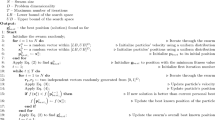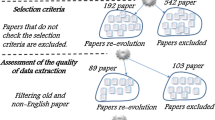Abstract
Task scheduling in cloud environment is a hot topic in current research. Effective scheduling of massive tasks submitted by users in cloud environment is of great practical significance for increasing the core competitiveness of companies and enterprises and improving their economic benefits. Faced with the urgent need for an efficient scheduling strategy in the real world, this paper analyzed the process of cloud task scheduling, and proposed a particle swarm optimization genetic hybrid algorithm based on phagocytosis PSO_PGA. Firstly, each generation of particle swarm is divided, and the position of the particles in the sub population is changed by using phagocytosis mechanism and crossover mutation of genetic algorithm, so as to expand the search range of the solution space. Then the sub populations are merged, which ensures the diversity of particles in the population and reduces the probability of the algorithm falling into the local optimal solution. Finally, the feedback mechanism is used to feed back the flight experience of the particle itself and the flight experience of the companion to the next generation particle population, so as to ensure that the particle population can always move towards the direction of excellent solution. Through simulation experiments, the proposed algorithm is compared with several other existing algorithms, and the results show that the proposed algorithm significantly improves the overall completion time of cloud tasks, and has higher convergence accuracy. It shows the effectiveness of the algorithm in cloud task scheduling.





Similar content being viewed by others
References
Hayes, B.: Cloud computing. Commun. ACM 51(7), 9–11 (2008)
Djebbar, E.I., Belalem, G.: Benadda M (2016) Task scheduling strategy based on data replication in scientific Cloud workflows. Multiagent Grid Syst 12(1), 55–67 (2016)
Sujana, J., Jennifa, A., Revathi, T., Priya, T., Siva, S., Muneeswaran, K.: Smart PSO-based secured scheduling approaches for scientific workflows in cloud computing. Soft Comput. 23(5), 1745–1765 (2019)
Somasundaram, T.S., Govindarajan, K.: CLOUDRB: a framework for scheduling and managing high-performance computing (HPC) applications in science cloud. Fut. Gener. Comput. Syst. 34, 47–65 (2014)
Singh, S., Chana, I.: A survey on resource scheduling in cloud computing: issues and challenges. J. Grid Comput. 14(2), 217–264 (2016)
Abdullah, M., Al-Muta’a, E.A., Al-Sanabani, M.: Integrated MOPSO algorithms for task scheduling in cloud computing. J. Intell. Fuzzy Syst. 36(2), 1823–1836 (2019)
Mathew T, Sekaran K.C., Jose, J.: Study and analysis of various task scheduling algorithms in the cloud computing environment. In: International conference on advances in computing, communications and informatics (ICACCI, 2014). IEEE, 2014: 658–664.
Liao, Q., Jiang, S., Hei, Q., et al.: Scheduling stochastic tasks with precedence constrain on cluster systems with heterogenous communication architecture. Algorithm Arch. Parallel Process. 9532, 85–99 (2015)
Yao, H., Fu, X., Li, H., Dong, G., Li, J.: Cloud task scheduling algorithm based on improved genetic algorithm. Intl. J. Perform. Eng. 13(7), 1070–1076 (2017)
Huang, X., Li, C., Chen, H., An, D.: Task scheduling in cloud computing using particle swarm optimization with time varying inertia weight strategies. Clust. Comput. 23(2), 1137–1147 (2020)
Arul Xavier, V.M., Annadurai, S.: Chaotic social spider algorithm for load balance aware task scheduling in cloud computing. Clust. Comput. 22(1), 287–297 (2019)
Sun, Y., Li, J., Fu, X., Wang, H., Li, H.: Application research based on improved genetic algorithm in cloud task scheduling. Intell. Fuzzy Syst. 38, 239–246 (2020)
Zhou, J., Dong, S.-B., Tang, D.-Y.: Task scheduling algorithm in cloud computing based on invasive tumor growth optimization. Chin. J. Comput. 41(6), 1140–1155 (2018)
Muthulakshmi, B., Somasundaram, K.: A hybrid ABC-SA based optimized scheduling and resource allocation for cloud environment. Clust. Comput. 22, 10769–10777 (2019)
Madni, S.H.H., Abd Latiff, M.S., Abdulhamid, S.M., Ali, J.: Hybrid gradient descent cuckoo search (HGDCS) algorithm for resource scheduling in IaaS cloud computing environment. Clust. Comput. 22(1), 301–334 (2019)
Valarmathi, R., Sheela, T.: Ranging and tuning based particle swarm optimization with bat algorithm for task scheduling in cloud computing. Clust. Comput. 22, 11975–11988 (2019)
Xuan, C., Dan, L.: Task scheduling of cloud computing using integrated particle swarm algorithm and ant colony algorithm. Clust. Comput. 22, 2761–2769 (2019)
Senthil Kumar, A.M., Venkatesan, M.: Task scheduling in a cloud computing environment using HGPSO algorithm. Clust. Comput. 22(1), 2179–2185 (2019)
Li, H., Yu, H.: Task scheduling strategy based on evolutionary algorithms in cloud computing. J. East China Univ. Sci. Technol 4, 556–562 (2015)
Li, T., Zhang, F., Wang, M.: Improved two period cloud task scheduling algorithm with genetic algorithm. J. Chin. Comput. Syst. 38(06), 1305–1310 (2017)
Fu, X., Cang, Y.: Task scheduling and virtual machine allocation policy in cloud computing environment. J. Syst. Eng. Electron. 26(4), 847–856 (2015)
Kennedy, J., Eberhart, R.: Particle swarm optimization. In: Proceedings of the IEEE international conference on neural networks (ICNN 95), pp. 1942–1948 (1995)
Li, Y., Lin, Y.: Cloud task scheduling based on hybrid particle swarm optimization algorithm. Comput. Technol. Autom. 1, 73–77 (2014)
Guo, L.Z., Wang, Y.J., Zhao, S.G., et al.: Particle swarm optimization embedded in variable neighbourhood search for task scheduling in cloud computing. J. Donghua Univ. 30(2), 145–152 (2013)
Zhao, S., Fu, X., Li, H., Dong, G., Li, J.: Research on cloud computing task scheduling based on improved particle swarm optimization. Intl. J. Perform. Eng. 13(7), 1063–1069 (2017)
Levenick, J.: Showing the way: a review of the second edition of Holland’s adaptation in natural and artificial systems. Artif. Intell. 100, 331–338 (1998). https://doi.org/10.1016/s0004-3702(98)00017-4
Agarwal, M., Srivastava, G.M.S.: Genetic algorithm-enabled particle swarm optimization (PSOGA)-based task scheduling in cloud computing environment. Intl. J. Inf. Technol. Decis. Making 17(04), 1237–1267 (2018). https://doi.org/10.1142/s0219622018500244
Ma, Y., Yun, W.: Research progress of genetic algorithm. Appl. Res. Comput. 4, 1201–1206 (2012)
Xia, G., Zhou, C., Jin, S., Huang, C., Xing, J., Liu, Z.: Sensitivity enhancement of two-dimensional materials based on genetic optimization in surface plasmon resonance. Sensors 19(5), 1198 (2019). https://doi.org/10.3390/s19051198
He, Y., Wang, X., Zhao, S., Zhang, X.: Design and applications of discrete evolutionary algorithm based on encoding transformation. J. Softw. 29(9), 2580–2594 (2018)
Tasgetiren, M.F., Pan, Q.K., Suganthan, P.N.: A discrete artificial bee colony algorithm for the total flowtime minimization in permutation flow shops. Inf. Sci. 181(16), 3459–3475 (2011)
Jia, D.L., Duan, X.T., Khan, M.K.: Binary Artificial Bee Colony optimization using bitwise operation. Comput. Ind. Eng. 76, 360–365 (2014)
Kiran, M.S.: The continuous artificial bee colony algorithm for binary optimization. Appl. Soft Comput. 33, 15–23 (2015)
He, Y.C., Wang, X.Z., Kou, Y.Z.: A binary differential evolution algorithm with hybrid encoding. J. Comput. Res. Dev. 44(9), 1476–1484 (2007). ((in Chinese with English abstract))
Feng, X., Pan, Y.: DPSO resource load balancing in cloud computing. Comput. Eng. Appl. 49(06), 105–108 (2013)
Rosales, C., Uribe-Querol, E.: Phagocytosis: a fundamental process in immunity. Biomed. Res. Int. (2017). https://doi.org/10.1155/2017/9042851
Yao, H.: Research on Task Scheduling Strategy Based on Improved Genetic Algorithm in Cloud Computing Environment. Inner Mongolia Agricultural University. (2018) ((in Chinese with English abstract))
Goyal, T., Singh, A., Agrawal, A.: Cloudsim: simulator for cloud computing infrastructure and modeling. In: International conference on modelling optimization and computing, pp. 3566–3572 (2012)
Mehmi, S., Verma, H.K., Sangal, A.L.: Simulation modeling of cloud computing for smart grid using CloudSim. J. Electr. Syst. Inf. Technol. 4(1), 159–172 (2017)
Rani, E., Kaur, H.: Study on fundamental usage of CloudSim simulator and algorithms of resource allocation in cloud computing. (2017). https://doi.org/10.1109/ICCCNT.2017.8203998
Acknowledgements
This research was financially supported by National key research and development plan: integrated water ecological management and water resource smart regulation technology demonstration of typical lakes in Inner Mongolia (2019YFC0409205), and National Natural Science Foundation of China (61962047), and Natural Science Foundation of Inner Mongolia Autonomous Region of China (No. 2019MS06015).
Author information
Authors and Affiliations
Corresponding author
Additional information
Publisher's Note
Springer Nature remains neutral with regard to jurisdictional claims in published maps and institutional affiliations.
Rights and permissions
About this article
Cite this article
Fu, X., Sun, Y., Wang, H. et al. Task scheduling of cloud computing based on hybrid particle swarm algorithm and genetic algorithm. Cluster Comput 26, 2479–2488 (2023). https://doi.org/10.1007/s10586-020-03221-z
Received:
Revised:
Accepted:
Published:
Issue Date:
DOI: https://doi.org/10.1007/s10586-020-03221-z




